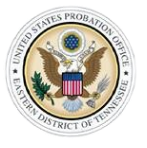The federal Courts structure and rules and procedures, along with many other information items are found at www.uscourts.gov
At the beginning of a federal criminal case, the principal actors are the U.S. attorney (the prosecutor) and the grand jury. The U.S. attorney represents the United States in most court proceedings, including all criminal prosecutions. The grand jury reviews evidence presented by the U.S. attorney and decides whether there is sufficient evidence to require a defendant to stand trial.
After a person is arrested, a pretrial services or probation officer of the court immediately interviews the defendant and conducts an investigation of the defendant's background. The information obtained by the pretrial services or probation office will be used to help a judge decide whether to release the defendant into the community before trial, and whether to impose conditions of release.
The standard of proof in a criminal trial is "beyond a reasonable doubt," which means the evidence must be so strong that there is no reasonable doubt that the defendant committed the crime.
At an initial appearance, a judge advises the defendant of the charges filed, considers whether the defendant should be held in jail until trial, and determines whether there is probable cause to believe that an offense has been committed and the defendant has committed it. Defendants who are unable to afford counsel are advised of their right to a court-appointed attorney. The court may appoint either a federal public defender or a private attorney who has agreed to accept such appointments from the court. In either type of appointment, the attorney will be paid by the court from funds appropriated by Congress. Defendants released into the community before trial may be required to obey certain restrictions, such as home confinement or drug testing, and to make periodic reports to a pretrial services officer to ensure appearance at trial.
The defendant enters a plea to the charges brought by the U.S. attorney at a hearing known as an arraignment. Most defendants — more than 90% — plead guilty rather than go to trial. If a defendant pleads guilty in return for the government agreeing to drop certain charges or to recommend a lenient sentence, the agreement often is called a "plea bargain." If the defendant pleads guilty, the judge may impose a sentence at that time, but more commonly will schedule a hearing to determine the sentence at a later date. In most felony cases the judge waits for the results of a presentence report, prepared by the court's probation office, before imposing sentence. If the defendant pleads not guilty, the judge will proceed to schedule a trial.
Criminal cases include a limited amount of pretrial discovery proceedings similar to those in civil cases, with substantial restrictions to protect the identity of government informants and to prevent intimidation of witnesses. The attorneys also may file motions, which are requests for rulings by the court before the trial. For example, defense attorneys often file a motion to suppress evidence, which asks the court to exclude from the trial evidence that the defendant believes was obtained by the government in violation of the defendant's constitutional rights.
In a criminal trial, the burden of proof is on the government. Defendants do not have to prove their innocence. Instead, the government must provide evidence to convince the jury of the defendant's guilt. The standard of proof in a criminal trial is proof "beyond a reasonable doubt," which means the evidence must be so strong that there is no reasonable doubt that the defendant committed the crime.
If a defendant is found not guilty, the defendant is released and the government may not appeal. Nor can the person be charged again with the same crime in a federal court. The Constitution prohibits "double jeopardy," or being tried twice for the same offense.
If the verdict is guilty, the judge determines the defendant's sentence according to special federal sentencing guidelines issued by the United States Sentencing Commission. The court's probation office prepares a report for the court that applies the sentencing guidelines to the individual defendant and the crimes for which he or she has been found guilty. During sentencing, the court may consider not only the evidence produced at trial, but all relevant information that may be provided by the pretrial services officer, the U.S. attorney, and the defense attorney. In unusual circumstances, the court may depart from the sentence calculated according to the sentencing guidelines.
A sentence may include time in prison, a fine to be paid to the government, and restitution to be paid to crime victims. The court's probation officers assist the court in enforcing any conditions that are imposed as part of a criminal sentence. The post-conviction supervision of offenders also may involve services such as substance abuse testing and treatment programs, job counseling, and alternative detention options in order to protect the public by ensuring completion of court conditions and improving your stability and success.
